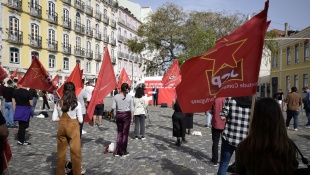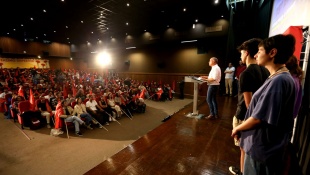Please accept a warm greeting for your initiative.
This greeting is all the more justified, since it is held in a context of special difficulties for the action and for the struggle that young communists, during these weeks, were able to face, never ceasing to be, with digital means or in person, where the youth are, accompanying their problems and aspirations, and assuming the demand for the necessary answers.
We were never absent from where injustice was, denouncing it. We never failed the call of those who saw their rights trampled on. We are not distracted in the defence of ways and solutions to the difficulties of each one. We did not hesitate when it was necessary to take up the fight.
A greeting, therefore, to JCP and, through it, to the Portuguese youth.
Today we decided to dedicate this initiative to the defence of Public School, assuming as an objective that, in the current circumstances, no student will be harmed.
This comprises two fundamental ideas, which form the fundamental basis of our Party’s political proposal for Education.
On the one hand, the idea that it is in Public School - free and of quality, we now add - that lies the answer to ensure that all children and youth have the right to education up to the highest levels of education.
Education, like other public services and the social functions of the State, cannot be subject to the dynamics of profit and interests of large economic groups.
Public School, precisely because it plays a central role in our collective life, because it must intervene, not only in the teaching/learning process, but should contribute to mitigate barriers and inequalities, because it must assume the role of anchoring populations throughout the national territory, because it must be at the service of a national development strategy for the country, it must have a privileged and priority attention of the political powers.
Public School, in its various levels from childhood to Higher Education, demands, therefore, budgetary and educational policy options that successive governments have not embraced.
Options of investment, ensuring the rehabilitation of many degraded schools, paying particular attention to the removal of materials that can be harmful, namely asbestos.
Options to spread public coverage throughout the national territory, from nurseries to Higher Education.
Options to hire workers in shortage, to begin with teachers and non-teaching staff, who have to be valued, guaranteeing an increase in their salaries, full compliance with their rights and valuing their careers.
Options to ensure technical staff to provide answers to new problems faced by students, whether in terms of mental health, vocational guidance, or sex education. Matters in which the school, as a community where young people are inserted for most of their time, should be seen more and more as central.
But this initiative holds yet another idea, of equal and undeniable importance.
That the school is first and foremost an institution for students. Without students, the school, as witnessed in so many parts of the country, closes down. It is true that the right-wing policy of successive governments has closed many schools, even with students, who are then dumped into other schools, often tens of kilometres away. But this continues to reveal that students must always be at the heart of education policies.
In this context, it is important to highlight measures to ensure that all young people, regardless of their economic, social or geographical origin, have the right of access to education.
It is important to ensure that everyone has the right to free school transport, with schedules that correspond to their needs.
It is important to guarantee the support directed to each student to overcome the difficulties that are found, starting with students with special educational needs, but not limited to these. A school to be of quality has to be inclusive, adapting its methods, its practices to the school universe that composes it.
It is important to implement the constitutional precept of free education. On our part, we are proud to have contributed, to have played a central role, for a path of reducing the costs for families, either by introducing free textbooks in all compulsory education, or by reducing the price of public transport passes, or by freezing tuition fees, which subsequently led to their reduction, or in support of nurseries. This path must be pursued, namely with the end of tuition fees, which will give a clear sign of valorisation of Public Higher Education.
It is also important to expand school social programmes at all levels, ensuring support for all dimensions of school life - transport, books and school materials, food, accommodation, cultural and sports activities. Social Programme, which, moreover, should give quick answers, and we cannot understand why in the month of May, almost at the end of the school year, there are still thousands of students who do not have final answers to their applications.
It is important to ensure that Vocational Education students have all their rights, guaranteeing timely payments, adapting the working hours and not requiring the replacement of classes, particularly during vacation time.
It is important to remove existing barriers to accessing the highest levels of education. First of all, by eliminating the unfair system of numerus clausus which limits the number of students who can access Higher Education.
But also guaranteeing equal access to all students. The government's recent move to take Vocational Education students to make an authentic tour around the country to stand for exams for which they were not prepared, to compete for half a dozen vacancies, having been presented as a new opportunity, is nothing more than one more hurdle, in what constitutes a dangerous experience for all candidates for Higher Education in the future.
It is important to give students the conditions for democratic participation, either by valuing student associations, with more means and more rights, or by returning to the democratic management of schools and institutions, as the PCP has insistently proposed.
In recent weeks, in the context of the epidemic outbreak, the weaknesses of Portuguese society have been exposed, on the one hand, and the government's options, on the other.
With the decision to close all units of the education system and to continue the school year with distance classes, the theory that we are all in the same boat, and the illusion that everything will be fine, has fallen apart.
More than 50 thousand youth without Internet access, without a computer, or having to share it with parents and siblings. Thousands of youth handed to parents who have to be teleworking at the same time. Hundreds of thousands of youth who did not have access to information sources, because the libraries were closed. Students forced to change residence. Closure of canteens and cafeterias.
In view of this, the government has erected as central objectives of Education, at this stage, the maintenance of national exams and the maintenance of tuition fees. With the return to school, the shortcomings of public transport became evident.
It matters little that the face-to-face classes cannot reach all students due to various reasons. There is little point in arguing with the instability brought in the students' lives. For the government, all other classes may not be taught. Only exams have to be guaranteed.
As for the tuition fees, confirming that they have nothing to do with raising the quality of education, but are rather an important part of the regular funding indispensable to Higher Education institutions, the PS, with the support of PSD, CDS, Iniciativa Liberal and Chega, rejected PCP's proposal to exempt students from payment during the period of the epidemic outbreak.
The PCP stated from the very first hour that no student should be harmed due the consequences of the epidemic outbreak. Life came to prove right the PCP and its warnings.
The national exams for access to higher education will not mitigate differences, but will aggravate them. The payment of tuition fees will equalize no one, rather it will weigh more on those who have fewer resources, including many who are now left without them. The assessment made on very differentiated bases may introduce glaring injustices. The announcements that distance education is going to become widespread in the coming years make very clear the aim to cut costs. Face-to-face teaching has a centrality and importance in the teaching/learning process that cannot be replaced by distance experiences. The role of teachers in the classroom is essential in accompanying students, and this is a crucial issue.
Curricular and programmatic solutions are needed in the current and in the next school year, in order to guarantee equality between all students in the teaching/learning process and to make up for the shortcomings.
There are problems of options and there are also problems of means and funding. Public School today reveals the aches of decades of underfunding promoted by PS, PSD and CDS.
Today, we will not invoke the example of the Novo Banco and the cartloads of money thrown into it.
But we will remember that while we are told that for Public School there is no money, billions of euros are expected for road and healthcare PPPs.
Public School is a pillar of the democratic regime, achievement of the April revolution and essential for the economic and social development of the country. The defence of Public School, free and of quality, is one of the features of the Patriotic and Left-wing Policies that we advocate and we propose to the Portuguese people. An objective that is necessary and possible to fulfil the best fighting traditions of Portuguese students.
This generation faces life with a reality never imagined. In all the bends of history, the youth, the most vivid flame of the revolution that Lenin spoke of, was always at the forefront of action and struggle, with confidence, with determination, with joy, facing the old to bring about the new. We will now know how to tackle all the old projects that under the cover of a supposed new one are under development, with all the energy that characterises us, to build a Portugal with a future.




